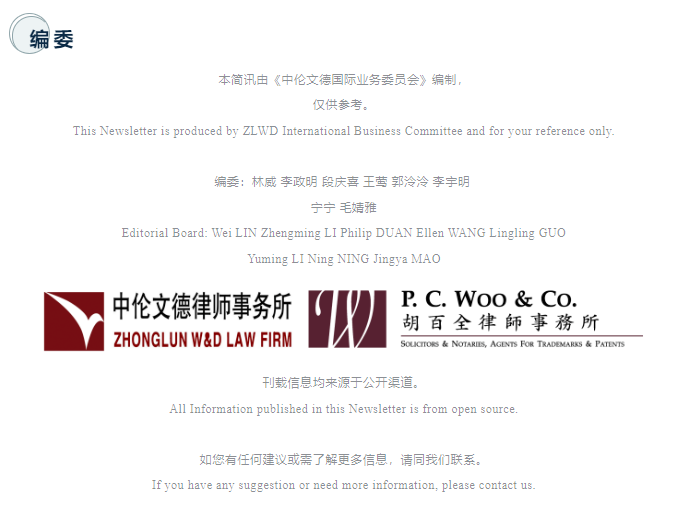
NEWS

NEWS
以下文章来源于中伦文德律师事务所 ,作者ZLWD

China Announces its Formal Accession to the Convention Abolishing the Requirement of Legalization for Foreign Public Documents
On 8 March 2023, the Chinese ambassador to the Netherlands formally submitted China’s instrument of accession to the Convention Abolishing the Requirement of Legalization for Foreign Public Documents (known as Hague Apostille Convention, hereinafter referred to as the "Convention") on behalf of China to the Ministry of Foreign Affairs of the Netherlands, which is the depositary of the Convention, which means China's formal accession to the Convention. The Convention will enter into force on 7 November 2023 between China and the other Contracting States that have not objected to this accession.
China's accession to the Convention will facilitate the authentication of documents and evidence that may be involved in maritime litigation or arbitration proceedings, such as on board certificates and documents issued by competent maritime authorities, as well as investigation reports or accident investigation documents of competent maritime authorities, which will only need foreign affairs authentication by local authorities and will no longer need to be notarised locally and authenticated by Chinese embassies and consulates.
The Observation Report of the 44th Session of Working Group III of UNCITRAL Released
The 44th session of Working Group III of the United Nations Commission on International Trade Law (UNCITRAL) was held in Vienna from 23 to 27 January 2023, and the China International Economic and Trade Arbitration Commission (CIETAC) was invited to participate in the meeting and collate the contents of the meeting into an observation report.
At this meeting, the Working Group continued to deliberate and adopted the provisions of the draft Code of Conduct for arbitrators, covering provisions on definitions, terms of use, text covering independence and impartiality of arbitrators and judges, limitations on multiple roles, duty of diligence, integrity and competence, ex parte communications, confidentiality, fees and expenses, assistants, duty of disclosure and compliance with the code of conduct, and also included appendix provisions on disclosure obligations.
In addition, the Working Group considered the relevant draft of the appellate mechanism in the Investor State Dispute Resolution Mechanism (hereinafter referred to as the "ISDS Mechanism"), covering the scope of appeals, grounds for appeal, and issues relating to the implementation of the appellate mechanism. It was generally agreed that the advantages and disadvantages of different implementation models needed to be further examined in light of the main objectives of the appellate mechanism. After discussion, the Working Group requested the Secretariat to further develop draft provisions on the operation of the appellate mechanism that could be adopted regardless of the implementation model chosen.
The drafts on the Code of Conduct for arbitrators and the appellate mechanism considered at this session are of positive significance in promoting the deepening reform of the ISDS Mechanism and the healthy development of international investment arbitration.
Foreign Arbitration and Dispute Resolution Institutions Can Set Up Institutions to Operate Business in Hainan Province
On January 19, 2023, Hainan Provincial Party Committee and the General Office of Hainan Provincial Government issued the "Construction Plan for the International Commercial Arbitration Centre of Hainan Free Trade Port" (hereinafter referred to as the "Plan"), which is proposed to promote the opening up of arbitration business and allow renowned foreign arbitration and dispute resolution institutions to set up business institutions and conduct foreign-related arbitration business in Hainan. In addition, the Programme also specifies the objectives of the construction of the Hainan Free Trade Port, namely that by the end of 2025, the pilot project of building an international commercial arbitration centre to serve the construction of a free trade port in Hainan and to face the Pacific and Indian Oceans will be basically completed, and the influence of international commercial arbitration in Hainan will be fully enhanced; by the end of 2035, the international commercial arbitration centre in Hainan free trade port will be fully completed, and the influence and credibility of international commercial arbitration will be among the first-class in the world.
In accordance with the guidelines of the Plan, the Provincial Department of Justice has issued the Administrative Measures for Foreign Arbitral Institutions to Establish Business Institutions in Hainan Free Trade Port (hereinafter referred to as the "Measures"), according to the Measures, starting from April 1, foreign arbitral institutions may set up business institutions in Hainan Free Trade Port after registration by the Provincial Department of Justice and filing with the Ministry of Justice, to conduct foreign-related arbitration business in civil and commercial disputes in the fields of international commercial, maritime, intellectual property and investment. The Measures also clarify the conditions and procedures for the establishment of business institutions by foreign arbitral institutions as well as the relevant management requirements, which will further promote the international development of the arbitration industry in the province and lay another institutional foundation for the construction of an international commercial arbitration centre in Hainan Free Trade Port.
The Supreme People's Court of the People's Republic of China:
The Arbitration Clause Where the Parties Agreed to Either Choose Arbitration or Litigation to the People's Court is Invalid
Legal Basis:
Civil Procedure Law
Article 177 I.
The People's Court of second instance shall, upon trial of an appeal case, take the following action in accordance with the following circumstances:
(2) Where the facts ascertained in the original judgment or ruling are wrong or the application of laws is wrong, the original judgment shall be amended, revoked or modified by way of a judgment or ruling;
Interpretation of the Supreme People's Court on Certain Issues relating to Application of the Arbitration Law of the People's Republic of China
Article 7
Where the parties agree that a dispute may be submitted to an arbitration agency for arbitration or filed with the people's court for commencement of legal proceedings, the arbitration agreement shall be invalid, unless one party has submitted an arbitration application to an arbitration agency but the other party failed to object within the time limit stipulated in the second paragraph of Article 20 of the Arbitration Law.
Case Description:
On 17 July 2018, Beijing Kedong Electric POWER CONTROL SYSTEM Co., Ltd. (hereinafter referred to as the “Kedong Company”) and Beijing MetarNet Technology Co., Ltd. (hereinafter referred to as the “MetarNet Company”) entered into the Technical Service Contract (hereinafter referred to as the "Contract"), Article 7 of the Contract stipulates that "In the event of a dispute arising in the course of the performance of this Contract, if the parties fail to reach a settlement or mediation, the dispute may be settled by arbitration or by judicial proceedings. 1. Any dispute arising out of or in connection with this contract shall be settled by the parties to this contract through friendly negotiation or, if negotiation fails to resolve the dispute, it shall be settled by arbitration, the arbitration institution shall be the Jinan Arbitration Commission. The arbitral award shall be final and binding on both parties. The costs of arbitration shall be borne by the losing party. 2. During the course of arbitration, the parties shall continue to perform their contractual obligations other than the arbitration part."
As a result of MetarNet Company's failure to perform its main payment obligations under the contract, Kedong Company filed a lawsuit with the Beijing Intellectual Property Court (hereinafter referred to as the "First Instance Court"). The First Instance Court held that although the first part of the clause provided for the option of judicial or arbitral settlement of disputes, according to the latter part of Article 7 of the Contract and the context of the clause, it showed that the parties have agreed that the dispute resolution clause intended to identify a specific arbitral institution to settle disputes, which is the Jinan Arbitration Commission. Accordingly, the First Instance Court ruled that Kedong's suit was dismissed.
Kedong Company then appealed to the Supreme People's Court (hereinafter referred to as the "Court"). Kedong Company argued that the main part of Article 7 of the Contract specified the dispute resolution route of arbitral or judicial settlement, which should negate the validity of the arbitration clause in accordance with the law, and that the First Instance Court erred in finding that arbitration was presumed to be applicable in conjunction with the sub-clause.
Court’s View:
In this case, the parties only agreed on one clause for the settlement of the contractual dispute, and there are two arbitration agreements under this clause. Among them, the clause expressly agreed on four ways of dispute resolution: reconciliation between the parties themselves; mediation under the auspices of the relevant institutions; and after the failure of reconciliation or mediation, arbitration or a judicial procedure. The next two paragraphs expressly agree on the arbitration institution being the Jinan Arbitration Commission, the bearing of arbitration fees and the effect of other provisions in the event of arbitration. In this case, it is clear that the parties should choose arbitral or judicial settlement of the dispute after fruitless negotiation, and the agreement on issues such as the Jinan Arbitration Committee and fees is only a further refinement of the choice of arbitration. The final resolution of the contractual dispute between the parties is either the choice of arbitration or litigation to the People's Court. According to Article 7 of the Interpretation of the Supreme People's Court on Certain Issues relating to Application of the Arbitration Law of the People's Republic of China, the arbitration agreement between the parties in this case in Article 7 on the settlement of contractual disputes was invalid. The Court did not support the opinion of the First Instance Court that "it can be concluded that the intention of the parties in agreeing to the contractual dispute resolution clause was to identify a specific arbitral institution to resolve the dispute, and that the reasons for the invalidity of the arbitration agreement put forward by Kedong Company are not valid".
Therefore, in accordance with the provisions of Article 177 I. (2) and Article 178 of the Civil Procedure Law of the People's Republic of China, the Court ruled to revoke (2021) No. 1026 Jing 73 Min Chu Civil Award of Beijing Intellectual Property Court and the case is ordered to be heard by the Beijing Intellectual Property Court.
Dubai International Financial Centre Court:
Although the Winning party is Involved in Bribery and Corruption, which is still Insufficient to Set Aside ICC Arbitration Award
Case Description:
Company D is a Dutch company and Company C is an Iraqi company owned by the Iraqi Ministry of Oil. On 14 December 2013, Company C and Company D entered into a contract (the "Contract"), governed by Iraqi law, by which Company D agreed to recover and remove the wreck of an oil tanker (the “Wreck”), the Mahrt, which had been bombed and sank during the first Gulf War in 1991. The site of the Wreck was within a marine exclusion zone (hereinafter referred to as the "Zone") established around an oil terminal (hereinafter referred to as the "Terminal"). In order to enter or leave the Zone, permission was required from the Iraqi Navy. Company D mobilised in February 2014. In March 2014, Company D informed Company C that it had located a 70-foot wooden dhow (hereinafter referred to as the "Dhow") lying within the Wreck. Company D cleared the Dhow, but there was a dispute about whether the Contract obliged Company C to compensate Company D for the clearance costs beyond the original contract price. Disputes arose between the parties in the course of the works.
On 3 August 2015, Company D gave notice that it was suspending work and commenced its suspension on the following day. Company D reduced on-site personnel on 15 August 2015. On 18 August 2015, it notified Company C that its vessels were being prevented from departing from the Zone. It was common ground before the tribunal in the arbitration that the Iraqi Navy then detained D’s fleet and another two vessels it had chartered (hereinafter referred to as the "Two Vessels"), preventing them from leaving the port. In this context, Company D engaged an Iraqi member of parliament (hereinafter referred to as the "Iraqi MP") to arrange meetings with the Ministry of Oil. This subsequently led to an investigation by the Dutch Public Prosecutor’s Office (hereinafter referred to as the "DPPO"). Ultimately, the Iraqi Navy lifted the blockade and Company D finished the works by 30 June 2017 and left the site. However, the parties remained in dispute. The contract contained an ICC arbitration agreement in relation to “any disputes concerning or arising from this Contract.” The seat was originally agreed to be Amman, Jordan. However, in January 2019, the parties agreed to change the seat to the Dubai International Financial Centre (DIFC).
In August 2018, Company D filed a Request for Arbitration, asserting various claims against Company C, including : (i) fees claimed in respect of the removal of the Dhow and (ii) losses suffered by Company D as a result of the Iraqi Navy refusing to allow its vessels to leave the Zone.
Company C initially objected to these claims and brought four counterclaims. Counterclaim No. 4 (hereinafter referred to as the "CC4") related to D’s dealings with the Iraqi MP and the then ongoing DPPO investigation. Company C alleged that Company D had bribed the Iraqi MP in an attempt to influence Company C to agree to D’s demands in relation to the suspension and detention and had thereby breached ethical obligations in the Contract. Given the ongoing investigation, the tribunal agreed to deal with CC4 in a confidential award (hereinafter referred to as the "CC4 Award"). On 2 November 2021, the tribunal rendered the Award and the CC4 Award.
The Award ruled that Company D was entitled to the claim for the detention of the marine spread and the costs of repeating work after the restart which had deteriorated. In respect of CC4, the tribunal found the complaint made out: Company D had entered into a business arrangement with the Iraqi MP and his son in an attempt to influence an action of Company C in a way which was “unethical and illicit” and in breach of the Contract. In its reasoning, the Tribunal stated that: "Claimant's unethical conduct amounts to cheating or gross fault that renders the latter liable for the harm suffered by Respondent as a result of Claimant's breach of the Ethical Conduct Declaration and the Contract. That said, and given that Claimant may not benefit from its own wrongdoing, it is not entitled to reap the profit it realized at Respondent's expense, otherwise the Arbitral Tribunal would be rewarding Claimant for its unethical conduct and illicit breach of the Ethical Conduct Declaration. Accordingly, Company D must reimburse Company C the amount of profit that Company D received under the Contract."
On 8 February 2022, Company C brought the Application, asking the Court to set aside the Award, or alternatively parts of it. There are two main reasons: the arbitral tribunal lacked jurisdiction to rule on the state act and the award is contrary to the public policy of the UAE and should therefore be set aside.
Court’s View:
The Dubai International Financial Centre Court (hereinafter referred to as the "Court") examined the two grounds as follows:
I. Although a naval blockade is a state act, in this case the blockade was prompted by the actions of Company C, which was a separate commercial act and could not be considered an state act or a sovereign state;
II. The unethical and illegal conduct of Company D occurred in the context of an attempt to resolve a dispute that had been submitted to arbitration. The Award had nothing to do with that conduct, which had been dealt with in the confidential Award, and there was no challenge to the conduct of the proceedings.
The logic of the Court's reasoning, particularly on the issue of public policy, was as follows: the starting point was the assumption that the bribery allegation had been established. Although the Court agreed that the bribery constituted a violation of international public policy, it was not sufficient to set aside the award on that ground. The Court held that the award itself did not violate public policy and that "the mere fact that an award is in some way associated with illegal conduct......does not necessarily give rise to a public policy objection". Company C has not established that the connection between the Contract and the bribery is such that the Contract should be rendered unenforceable and the Award set aside. The Court noted that if Company D had never approached the Iraqi MP, Company D would still have been entitled to the relief granted in the Award, as the cause of action relating to that relief did not arise out of the bribery in question. There was therefore no evidence that the Award itself was contrary to international public policy: the Award was a decision on a dispute that arose prior to, and had no bearing on, Company D's improper conduct.
The Court also noted that if Company C took the position that the Contract should be rendered unenforceable, that is a claim it should have made in the arbitration. But rather than do that, Company C in fact relied on the Contract to make a counterclaim. And inasmuch as the tribunal turned its mind to the question, the Court held that it is likely that revisiting the same question would be tantamount to reviewing the merits of the tribunal’s determination. This was beyond the scope of judicial review of the arbitration.
In summary, the Court dismissed Company C's application to set aside the Award.


